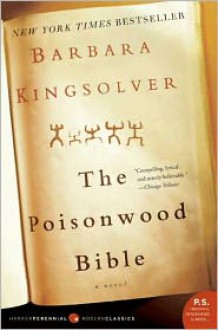The Barnes & Noble Review Barbara Kingsolver calls her new novel, The Poisonwood Bible, her "magnum opus." And it is — 500-plus pages of "the deepest-delving" fiction she's ever written, not to mention a fresh new locale. Packed with themes of cultural diversity, political morality, and...
show more
The Barnes & Noble Review Barbara Kingsolver calls her new novel, The Poisonwood Bible, her "magnum opus." And it is — 500-plus pages of "the deepest-delving" fiction she's ever written, not to mention a fresh new locale. Packed with themes of cultural diversity, political morality, and environmental ethics, this one, unlike her three previous Southwestern novels, is set in postcolonial Africa. The narrative begins in the relatively tame Belgian Congo of the late 1950s, gains speed in the tumultuous early '60s (with the coup of the independent Lumumba government toppled by the CIA-backed, UN-funded Mobutu government), then branches out several decades in the future. "I set out to ask a very long question," Kingsolver says. "What have we done as a nation, a culture, a people to Africa, and where do we go from here?" Kingsolver has been waiting her entire life to write this novel. When she was seven years old, her mother and father, both public health officials, moved their family to the Congo for several years. She laughs and says, "I'm happy to say my parents are wonderful people, not at all like the family in the book." There they practiced their medicine while young Barbara kept a journal. She explains the impact: "Living in that part of the world during the formative years of my childhood introduced me to the possibility that everything I had always assumed was right could be totally wrong in another place." Although the story is in no way about her personal familial experience, much of the setting and detail are torn from the pages of that journal. That's not to say she didn't do a heapofresearch; there's an extensive bibliography included at the end of the novel. She also made a number of trips back to Africa and had many experts comment on the manuscript, including the activist, journalist, convicted murderer, and cause célèbre Mumia Abu-Jamal, who gave it
show less

